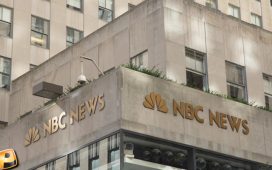Last Updated on August 8, 2014
George Zimmerman’s lawyer says his client will appeal after a judge tosses the Zimmerman lawsuit against NBC accusing the network of defamation.
When the George Zimmerman decided to sue NBC for defamation over a report about the shooting that left Trayvon Martin dead, the media haters were only too happy to armchair quarterback the network’s coverage.
Oddly enough, they’ve been pretty quiet about the latest development, which is that the Zimmerman lawsuit against NBC was tossed last week.
The reason? As predicted, that Zimmerman’s side failed to show malice on the part of NBC.
“Actual malice,” which would mean that reporters disseminated information they knew was false or who were recklessly disregarded the truth when they disseminated it, something that is extremely difficult for a defense team to prove to begin with. The judge ruled that Zimmerman was a “public figure,” which required the proof of malice.
The case against NBC centered on a report in which an audio recording of Zimmerman’s 911 call had been edited for an on-air report about the shooting of Trayvon Martin.
In the original broadcast, the edited version made it appear to some that Zimmerman was overly focused on Martin’s race. The transcript of the snippet NBC aired was as follows:
Zimmerman: This guy looks like he’s up to no good. He looks black.
But the actual call was longer, and the full portion of this section of the call reveals that Zimmerman didn’t mention Martin’s race until he was specifically asked about it:
Zimmerman: This guy looks like he’s up to no good. Or he’s on drugs or something. It’s raining and he’s just walking around, looking about.
Dispatcher: OK, and this guy — is he black, white or Hispanic?
Zimmerman: He looks black.
NBC News immediately launched an internal investigation into how the call had been editing and wound up firing at least three people over the gaffe.
As I said back in 2012, in hindsight, the edit looks like a remarkably bad idea.
But in the moment, vision isn’t always 20/20 the way hindsight is.
The edit was clearly made for the sake of time. The extra time required for the operator to ask the follow-up question was almost certainly cut to shorten the overall clip, a practice that happens all the time in media.
Unfortunately, in this rare case, it appeared to some to change the meaning of what was said, which shouldn’t have happened, but in the pressure of getting a story to fit in its allotted time slot with multiple people having their hands on the process, it was much more likely to have been carelessness than an intentional disregard for the truth of the story.
There is a difference between a slip-up and not caring about what you’re doing.

















